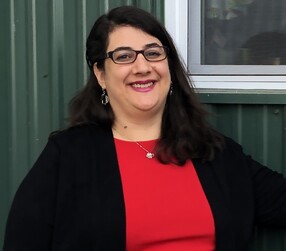Fellowships & Writing Center Executive Director Appointed
Dr. Jeannette Miller joins GSAS from Johns Hopkins University

During summer 2020, the GSAS Fellowships Office and the Center for Writing and Communicating Ideas merged to form the Fellowships and Writing Center (FWC), structured to provide enhanced support for GSAS students. In December 2020, Dr. Jeanette Miller was appointed the FWC’s inaugural executive director.
Miller comes to GSAS from Johns Hopkins University, where she served as associate director of the National Fellowships Program (NFP). As associate director, she set and promoted the strategic vision and mission of the NFP in alignment with the university’s missions, providing all applicants, whether they win or not, access to a transformative process and exciting possibilities for growth. She also worked to make the NFP an accessible, inclusive space for all students and alumni by fostering a community of applicants, embracing their diversity, and cultivating a sense of belonging.
Miller earned her PhD in French & Francophone studies from the Pennsylvania State University in 2012, an MA from New York University’s Institute of French Studies in 2003, and a BA, with distinction, in government & foreign affairs/French from the University of Virginia in 1998.
GSAS Communications spoke to Miller about her experience and her hopes for the role.
What experience do you bring to the position?
I spent the last seven years as a fellowships advisor at Johns Hopkins University, where I worked with graduate students applying to awards including the Fulbright, the SSRC International Dissertation Fellowship, and the NSF Graduate Research Fellowship. As a fellowships advisor, I believe firmly in the transformative nature of the process, particularly in terms of written expression, and I have developed an array of supports for students, from essay workshops to writing videos. For the last two-and-a-half years, I led a team of PhD and MFA student tutors and a full-time advisor, providing strategic leadership to the unit to enhance the student experience. Last cycle, over 50 percent of students who applied for a Fulbright through our office won the award.
You are taking on an important new role during a pandemic. What benefits do you see in the FWC’s virtual platform?
I found in my recent work providing feedback on student fellowship essays that the virtual platform didn’t interrupt my team’s ability to advise students, and I expect this will be the same at the FWC. Indeed, there are several benefits of the virtual platform. Students who are off campus can more easily participate in one-on-one sessions and join workshops, providing them a connection to GSAS. It is also timesaving for on campus students to be able to meet with FWC staff without having to leave their homes. Finally, resources that we provide in hard copy in the FWC are online, making them more accessible.
Fellowships is about both finding funding and enhancing writing skills to obtain that funding. How will you approach these overlapping yet distinct tasks?
Finding fellowships requires the type of research skills that Harvard PhD students use regularly and the initiative to seek out FWC and departmental/disciplinary resources. The FWC will make available a list of PhD funding sources for different stages of their graduate career (pre-dissertation research, dissertation research, write-up, etc.). We also will encourage students to work with their department and learned societies within their discipline to seek potential sources of support. Once located, students will work with FWC staff to compose their most compelling applications. The writing process is iterative and requires one to spend as much time thinking as writing, so getting started early is crucial. In addition to working with tutors one-on-one, the FWC will offer writing resources (short texts on specific stylistic elements, for example) to help students to grow in their writing.
Five postdoctoral fellowships and writing fellows are also joining the Center. How will you leverage their skills to support students?
The opportunity to mentor a talented group of postdoctoral fellows attracted me to this position. I found in my previous position while supervising PhD students and recent PhDs that they brought a skillset from their disciplinary and pedagogical trainings that collectively benefitted students in different departments and who had different areas to work on their written expression. My aim in leading such a group is to recognize and draw on their strengths while presenting them with opportunities to grow other areas of their skillsets, both of which provide support to the students they tutor.
What are you most looking forward to in the role?
I’m really excited to work with and get to know GSAS students, whether through individual tutoring sessions or the rich slate of workshops and programming that the FWC will offer. I love learning about a variety of academic projects and students’ motivations for pursuing their dissertation topics, while helping them to express themselves with more clarity and confidence. Through its growth mindset approach, my hope is that the FWC will be a space where students improve their written expression skills from their first semester at Harvard until they defend as they take advantage of its resources to heighten the impact of their research.
Get the Latest Updates
Join Our Newsletter
Subscribe to Colloquy Podcast
Simplecast





